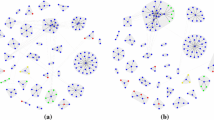Abstract
In this paper we study formulations and algorithms for the cycle clustering problem, a partitioning problem over the vertex set of a directed graph with nonnegative arc weights that is used to identify cyclic behavior in simulation data generated from nonreversible Markov state models. Here, in addition to partitioning the vertices into a set of coherent clusters, the resulting clusters must be ordered into a cycle such as to maximize the total net flow in the forward direction of the cycle. We provide a problem-specific binary programming formulation and compare it to a formulation based on the reformulation-linearization technique (RLT). We present theoretical results on the polytope associated with our custom formulation and develop primal heuristics and separation routines for both formulations. In computational experiments on simulation data from biology we find that branch and cut based on the problem-specific formulation outperforms the one based on RLT.
Access this chapter
Tax calculation will be finalised at checkout
Purchases are for personal use only
Similar content being viewed by others
References
Achterberg, T.: Constraint Integer Programming. Ph.D. thesis (2007). http://nbn-resolving.de/urn/resolver.pl?urn:nbn:de:0297-zib-11129
Adams, W.P., Sherali, H.D.: A reformulation-linearization technique for solving discrete and continuous nonconvex problems (1999). https://doi.org/10.1007/978-1-4757-4388-3
Berthold, T.: Measuring the impact of primal heuristics. OR Lett. 41(6), 611–614 (2013). https://doi.org/10.1016/j.orl.2013.08.007
Brooks, S., Gelman, A., Jones, G., Meng, X.L.: Handbook of Markov Chain Monte Carlo. CRC Press, Boca Raton (2011)
Chopra, S., Rao, M.R.: The partition problem. Math. Prog. 59(1), 87–115 (1993). https://doi.org/10.1007/BF01581239
Elowitz, M.B., Leibler, S.: A synthetic oscillatory network of transcriptional regulators. Nature 403(6767), 335–338 (2000). https://doi.org/10.1038/35002125
Gleixner, A., Bastubbe, M., Eifler, L., et. al: The SCIP optimization suite 6.0. ZIB-Report 18-26 (2018). https://nbn-resolving.org/urn:nbn:de:0297-zib-69361
Grötschel, M., Wakabayashi, Y.: Facets of the clique partitioning polytope. Math. Prog. 47(1), 367–387 (1990). https://doi.org/10.1007/BF01580870
Hindmarsh, J.L., Rose, R.: A model of neuronal bursting using three coupled first order differential equations. Proc. Roy. Soc. Lond. B. Biol. Sci. 221(1222), 87–102 (1984). https://doi.org/10.1098/rspb.1984.0024
Kernighan, B.W., Lin, S.: An efficient heuristic procedure for partitioning graphs. Bell Syst. Tech. J. 49(2), 291–307 (1970). https://doi.org/10.1002/j.1538-7305.1970.tb01770.x
Liberti, L.: Compact linearization for binary quadratic problems. 4OR 5(3). 231–245 (2007). https://doi.org/10.1007/s10288-006-0015-3
Mallach, S.: Compact linearization for binary quadratic problems subject to assignment constraints. 4OR 16(3), 295–309 (2018).https://doi.org/10.1007/s10288-017-0364-0
McCormick, G.P.: Computability of global solutions to factorable nonconvex programs: Part I - convex underestimating problems. Math. Prog. 10(1), 147–175 (1976). https://doi.org/10.1007/BF01580665
Padberg, M.: The Boolean quadric polytope: some characteristics, facets and relatives. Math. Prog. 45(1), 139–172 (1989). https://doi.org/10.1007/BF01589101
Reuter, B., et al.: Generalized Markov state modeling method for nonequilibrium biomolecular dynamics: exemplified on Amyloid \(\upbeta \) conformational dynamics driven by an oscillating electric field. J. Chem. Theory Comput. 14(7), 3579–3594 (2018). https://doi.org/10.1021/acs.jctc.8b00079
Witzig, J., Beckenbach, I., Eifler, L., et al.: Mixed-integer programming for cycle detection in nonreversible Markov processes. Multiscale Model. Simul. 16(1), 248–265 (2018). https://doi.org/10.1137/16M1091162
Acknowledgments
We wish to thank Konstantin Fackeldey, Andreas Grever, and Marcus Weber for supplying us with simulation data for our experiments. This work has been supported by the Research Campus MODAL funded by the German Federal Ministry of Education and Research (BMBF grants 05M14ZAM, 05M20ZBM).
Author information
Authors and Affiliations
Corresponding author
Editor information
Editors and Affiliations
Ethics declarations
Disclosure of Interests
The authors have no competing interests to declare that are relevant to the content of this article.
Rights and permissions
Copyright information
© 2024 The Author(s), under exclusive license to Springer Nature Switzerland AG
About this paper
Cite this paper
Eifler, L., Witzig, J., Gleixner, A. (2024). Branch and Cut for Partitioning a Graph into a Cycle of Clusters. In: Basu, A., Mahjoub, A.R., Salazar González, J.J. (eds) Combinatorial Optimization. ISCO 2024. Lecture Notes in Computer Science, vol 14594. Springer, Cham. https://doi.org/10.1007/978-3-031-60924-4_8
Download citation
DOI: https://doi.org/10.1007/978-3-031-60924-4_8
Published:
Publisher Name: Springer, Cham
Print ISBN: 978-3-031-60923-7
Online ISBN: 978-3-031-60924-4
eBook Packages: Computer ScienceComputer Science (R0)




